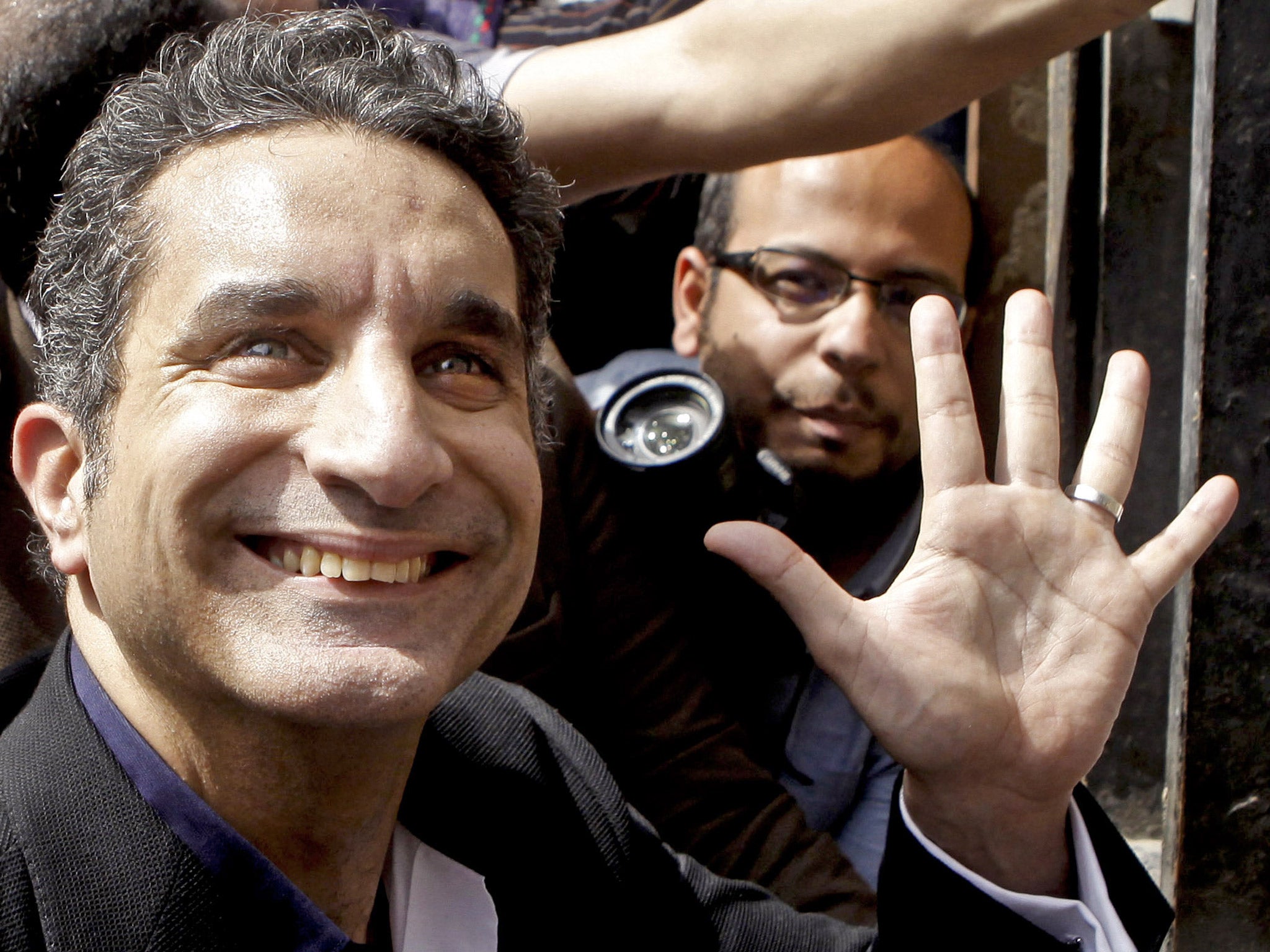Can a joke harm national security? Egyptian TV’s answer to Jon Stewart investigated
Top prosecutor targets satirist Bassem Youssef after show pokes fun at military rule’s support

He has borne exhaustive comparisons to Jon Stewart, the American satirist whose nightly show regularly pokes fun at the great and the good in Washington. But for Bassem Youssef, the Egyptian comedian who became a TV sensation following the fall of Hosni Mubarak, satire is a joke where the punch-line can end in jail.
Just days after kicking off the new series of his wildly popular show, Al Bernameg – or The Programme – Egypt’s top prosecutor ordered an investigation into whether Mr Youssef had harmed national security by mocking supporters of the country’s military.
Mr Youssef, 39, is the Middle East’s most famous satirist – having shot to prominence through homemade YouTube skits. He is now watched by 30 million viewers.
But this week’s announcement highlights the precariousness of the current political climate.
Public criticism of the military is extremely muted. The media has faithfully trumpeted the government’s so-called “War on Terror”, while many mainstream politicians have failed to question the dragnet detentions of more than 2,000 Islamists and other dissidents.
In this deeply divided society, Mr Youssef’s show has become one of the only high profile checks on the military-backed government.
“The Egyptian media have been totally taking the side of the military,” said Diaa Adel, a 23-year-old producer. “On the other hand, channels like Al Jazeera have taken the side of the Muslim Brotherhood, and there isn’t one programme in between.
“The only person talking about the perspective from my side is Bassem Youssef.”
Egyptian leaders have often found their sense of humour wanting. It was reported that Gamal Abdel Nasser, the 1960s demagogue, hired officials to take note of the anti-authoritarian tea-room jokes doing the rounds during his rule.
Given the political shifts which have taken place since July, there had been fevered speculation about how Mr Youssef would handle his new series.
It was the military which ousted Mr Morsi on the back of a summer revolt, while army chief General Abdel Fattah al-Sisi – whose face can now be found adorning novelty chocolates and wrist watches – is the object of intense speculation about a run for the Presidency.
Egypt’s army, a conscript force that enjoys widespread popularity, has historically been a red line for critical journalists.
So a looming question mark was hanging over whether Mr Youssef – who had mercilessly skewered Mr Morsi – would dare to tackle Egypt’s most glaring satirical target: General al-Sisi himself. In the end, he trod his thread-like tightrope as best he could, ridiculing the current wave of Sisi-mania without a direct reference to al-Sisi in person.
Although finding time for a few jabs at political Islam, Youssef also alluded to the threats posed by the growing tide of nationalism.
“I am not with hypocrisy, deification of individuals and the creation of pharaohs,” he said in a sombre moment at the end of the show. “We are afraid that fascism in the name of religion will be replaces by fascism in the name of nationalism.”
Not everybody was amused. Mr Youssef’s own channel released a statement saying the company was “keen on not using phrases and innuendos that may lead to mocking national sentiment”.9
Subscribe to Independent Premium to bookmark this article
Want to bookmark your favourite articles and stories to read or reference later? Start your Independent Premium subscription today.

Join our commenting forum
Join thought-provoking conversations, follow other Independent readers and see their replies